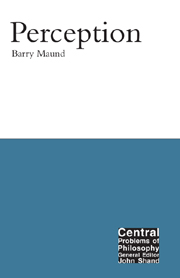Book contents
- Frontmatter
- Contents
- Preface
- 1 The philosophy of perception
- 2 A theory of natural realism
- 3 Theories of perceptual experiences
- 4 Representationalism: representations as natural signs
- 5 Natural realism: Putnam, Austin and Heidegger
- 6 Perception: the argument from illusion
- 7 The phenomenal and phenomenological senses of “looks”
- 8 Types of perceptual content
- 9 The representationalist–intentionalist thesis
- 10 Adverbialist accounts of perceptual experience
- Conclusion
- Notes
- References
- Index
5 - Natural realism: Putnam, Austin and Heidegger
- Frontmatter
- Contents
- Preface
- 1 The philosophy of perception
- 2 A theory of natural realism
- 3 Theories of perceptual experiences
- 4 Representationalism: representations as natural signs
- 5 Natural realism: Putnam, Austin and Heidegger
- 6 Perception: the argument from illusion
- 7 The phenomenal and phenomenological senses of “looks”
- 8 Types of perceptual content
- 9 The representationalist–intentionalist thesis
- 10 Adverbialist accounts of perceptual experience
- Conclusion
- Notes
- References
- Index
Summary
According to the indirect form of representationalism, which I have defended, when one perceives a physical object, one is immediately aware not of physical objects and their qualities, but of some items other than these physical objects. These items or intermediaries are phenomenal in character, although their metaphysical status is open to debate. They may be phenomenal objects, sensory states or experiences, instances of sensory qualities, or even, I shall argue, ways of appearing (i.e. adverbially modified sensings). The thesis that one is immediately aware of such items, or is directly sensing them, is not confined to the representative theory. It is shared by prominent forms of idealism and phenomenalism. For representationalists, these items are intermediaries between the perceiving subject and the physical object or state of affairs; for idealists and phenomenalists, they are not. The idealist–phenomenalist, however, normally distinguishes between the sense of “perceive” in which one immediately perceives, or senses, the phenomenal item, and the sense of “perceive” in which one perceives the physical object. Price, for example, draws a distinction between perceiving a physical object, and sensing a sense-datum. For the subject to perceive a physical object requires two things: sensing a sensory particular and being perceptually conscious of a physical object, that is, taking it that there is a physical object present (to which the sensory particular is related).
The claim that the perceiver is, in the appropriate sense, “immediately aware” of some phenomenal item has been supported by a range of classical arguments in the philosophical tradition.
- Type
- Chapter
- Information
- Perception , pp. 89 - 110Publisher: Acumen PublishingPrint publication year: 2002

